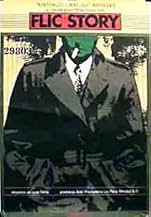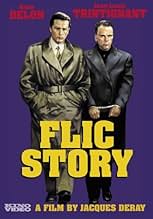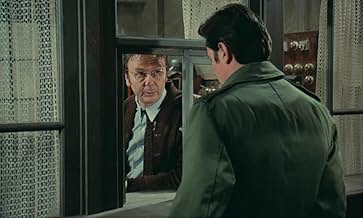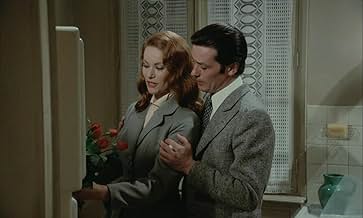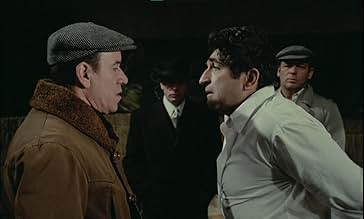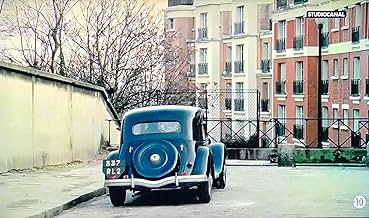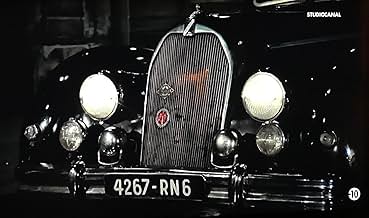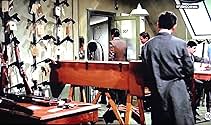PUNTUACIÓN EN IMDb
6,9/10
3,3 mil
TU PUNTUACIÓN
Añade un argumento en tu idiomaThe hunt for a seasoned killer becomes a matter of life for a policeman. Action-packed drama based on real events.The hunt for a seasoned killer becomes a matter of life for a policeman. Action-packed drama based on real events.The hunt for a seasoned killer becomes a matter of life for a policeman. Action-packed drama based on real events.
- Dirección
- Guión
- Reparto principal
Reseñas destacadas
The best performances for both Trintignant and Delon, based on a true story dig in the criminal files of the French police. Classical, nothing unexpected but so brilliantly made, pulled by excellent acting and directing. Trintignant told later that he disliked the character he played here, so far from his own sensibility; and that's precisely for this reason that's his performance is awesome. The true definition of a true actor, who can play characters totally different from himself. Don't miss his glance, his terrific and terrifying glance, maybe more terrifying than the real Emile Buisson himself. One of most cold blooded killer that the movie- and not only French - industry has ever shown. Great ending too.
It's refreshing to watch a movie that gives the impression someone actually wrote a script about a story they wanted to tell and the story makes sense. It doesn't happen so often nowadays when most movies are self-indulgent; open-endedly boring or patronizing.
Delon and Trintignant, two of the biggest French stars of the 70s are respectively Borniche (the cop) and the killer-robber Buisson. The story is told in a linear way - thank you! - without special effects and only one car chase, short and realist enough.
Borniche is a top detective charged to find Buisson, a cold-hearted, pitiless criminal who escaped from prison. Loosely based on a real story - the chase lasted several years - Borniche is a sort of good cop, interested only in justice and reprimanding is "bad cop" colleagues, while there isn't much justification for Buisson violence. Therefore, the moral compass isn't too skewed.
I watched this in French and being my first Delon/Trintignant film, I was disappointed only by their ordinary, unsexy voices. Trintignant was especially chilly as the criminal, Delon convincing as the quiet cop, violence was few and far between and even more shocking because shown in all its meaningless brutality.
Delon and Trintignant, two of the biggest French stars of the 70s are respectively Borniche (the cop) and the killer-robber Buisson. The story is told in a linear way - thank you! - without special effects and only one car chase, short and realist enough.
Borniche is a top detective charged to find Buisson, a cold-hearted, pitiless criminal who escaped from prison. Loosely based on a real story - the chase lasted several years - Borniche is a sort of good cop, interested only in justice and reprimanding is "bad cop" colleagues, while there isn't much justification for Buisson violence. Therefore, the moral compass isn't too skewed.
I watched this in French and being my first Delon/Trintignant film, I was disappointed only by their ordinary, unsexy voices. Trintignant was especially chilly as the criminal, Delon convincing as the quiet cop, violence was few and far between and even more shocking because shown in all its meaningless brutality.
'Flic Story' (1975) is one of the last films in a remarkable series of films 'noir' inspired by the world of French gangsters, made between the 1950s and the 1970s. The master of the genre was Jean-Pierre Melville, whose last film, 'Un flic' from 1972, cast Alain Delon as a crime fighting policeman. Rumor goes that when Jacques Deray undertook the making of this film inspired by a real case and true characters, after having managed to secure the participation of the two actors, he intended to give Delon the role of the gangster and Jean-Louis Trintignant that of the vigilante policeman. It would have been closer to the profiles of the previous roles played by the two, but it would have been a shame. The reversal of roles allows Trintignant to create one of the best performances of his career, and Delon is not bad at all either. The result was a film that Melville would surely have approved of.
Roger Borniche, whose memoirs inspired the film's script, had been a hero during World War II, who had enrolled in the police force because of a personal history. Idealistic, individualistic, unconventional in his choice of working methods, he often comes into conflict with his superiors and his entourage of bureaucratic colleagues, some of whom bear the burden of collaboration during the war. Having reached the position of inspector and with ambitions for advancement, he receives as a mission the capture of Emile Buisson, an escaped and extremely dangerous gangster who flees justice, robs and leaves corpses behind. The mission will not be simple and the pursuit will last many years.
The script is built as an alternation of scenes in which the policeman and the escaped criminal appear, the two meeting only at the end. The duel between Borniche and Buisson in the film translates into an artistic duel between the two great actors, among the most popular and appreciated of their generation. If a winner must be declared, he is Trintignant. They say that the roles of bad guys are easier to interpret. It may be true, but Trintignant's gaze of a killer (sometimes out of pleasure) can still freeze the blood in the veins of viewers. The criminal has one softer side: he loves Edith Piaf's music, and this will play a role in his capture, in an anthological scene. The entire cast is very well chosen and directed, the characters are credible, the milieu of crime and the police methods and stations of the 40s-50s are very authentically reconstructed. The only criticism I would make of the script is that it does not reflect the passage of time. The pursuit lasted for many years and became an obsession for the French media but also for the police, however the events unfold on screen in the almost two hours of cinema without marking the cinematic time. The screenwriters may have relied on the fact that this case was still present in the public memory of France in the 70s, but that is no longer true today. However, this is only a minor detail in an engaging and atmospheric film, which is worth watching or rewatching.
Roger Borniche, whose memoirs inspired the film's script, had been a hero during World War II, who had enrolled in the police force because of a personal history. Idealistic, individualistic, unconventional in his choice of working methods, he often comes into conflict with his superiors and his entourage of bureaucratic colleagues, some of whom bear the burden of collaboration during the war. Having reached the position of inspector and with ambitions for advancement, he receives as a mission the capture of Emile Buisson, an escaped and extremely dangerous gangster who flees justice, robs and leaves corpses behind. The mission will not be simple and the pursuit will last many years.
The script is built as an alternation of scenes in which the policeman and the escaped criminal appear, the two meeting only at the end. The duel between Borniche and Buisson in the film translates into an artistic duel between the two great actors, among the most popular and appreciated of their generation. If a winner must be declared, he is Trintignant. They say that the roles of bad guys are easier to interpret. It may be true, but Trintignant's gaze of a killer (sometimes out of pleasure) can still freeze the blood in the veins of viewers. The criminal has one softer side: he loves Edith Piaf's music, and this will play a role in his capture, in an anthological scene. The entire cast is very well chosen and directed, the characters are credible, the milieu of crime and the police methods and stations of the 40s-50s are very authentically reconstructed. The only criticism I would make of the script is that it does not reflect the passage of time. The pursuit lasted for many years and became an obsession for the French media but also for the police, however the events unfold on screen in the almost two hours of cinema without marking the cinematic time. The screenwriters may have relied on the fact that this case was still present in the public memory of France in the 70s, but that is no longer true today. However, this is only a minor detail in an engaging and atmospheric film, which is worth watching or rewatching.
Sitting through this for the first time I was under the delusion it had been directed by Melville, although it didn't seem to be quite his style. Unsurprisingly, it wasn't, but by someone called Deray, whom I'd never heard of. The history of the pursuit, over several years, of a dedicated cop after an unrestrained and ruthless thief and killer, it turns out to be a masterpiece, with depth. Gradually it grows clear that the two men are psychologically related: two sides of one coin. It dawns on the viewer, or it did on this one, that it's to be doubted if there's anything that can be called free will. Both men are creatures of circumstance, who have not really chosen their destinies. There is a curious rapport between them. Cops need robbers, like cowboys need Indians. Each can look on the other and think: there, but for arbitrary fortune, go I. Buisson's use of his gun seems as natural and spontaneous as any of Tarantino's reservoir dogs. Borniche suffers his own harassment and pressures. No man chooses his birth or the pattern of his life. Or does he ? A thought-inducing experience.
one of films who are more than a good one. because it gives more than good story, inspired performances, tension or credible dialogues. first - it is an admirable thriller. than - the work of Jean -Louis Trintignan is impressive , because he does a not real comfortable role in a subtle manner. the presence on screen, in same film of Ranato Salvatori and Anton Delon reminds the air of Rocco and his brothers by Visconti and that detail is important for a part of public. not the least, it is a real story who has the chance to be presented in the right manner, the atmosphere being recreated in wise manner. a film who has useful demonstration of few legendary actors. and who suggest a kind of portrait's sketch of evil.in same measure, the scenes behind Buisson's catchment and the habits after the moments of Borniche and Buisson are more than interesting.
¿Sabías que...?
- CuriosidadesBased on a true story.
- ConexionesFeatured in Jinek: Episodio #2.9 (2014)
Selecciones populares
Inicia sesión para calificar y añadir a tu lista para recibir recomendaciones personalizadas
- How long is Flic Story?Con tecnología de Alexa
Detalles
- Fecha de lanzamiento
- Países de origen
- Idioma
- Títulos en diferentes países
- Historia de un policía
- Localizaciones del rodaje
- 8 Rue Désirée, Paris 20, París, Francia(Buisson hides out at Suzanne's apartment)
- Empresas productoras
- Ver más compañías en los créditos en IMDbPro
- Duración1 hora 52 minutos
- Mezcla de sonido
- Relación de aspecto
- 1.66 : 1
Contribuir a esta página
Sugerir un cambio o añadir el contenido que falta

Principal laguna de datos
By what name was Flic story (1975) officially released in India in English?
Responde
![Bande-annonce [OV]](https://m.media-amazon.com/images/M/MV5BNTg2NDc4MzgtZTFmZi00NTM2LWI4MmYtNjAzZGFiYzE5MmIyXkEyXkFqcGdeQXRyYW5zY29kZS13b3JrZmxvdw@@._V1_QL75_UX500_CR0)
